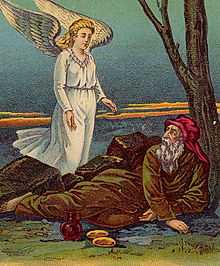Apocalypse of Elijah
The Apocalypse of Elijah is an anonymous apocryphal work presenting itself as a revelation given by an angel. Two versions are known today, a Coptic Christian fragmentary version and a Hebrew Jewish version. The title derives from mentions of Elijah within the text, although there is no other reason to assume that he is meant to be the author.
Dating and provenance
This apocalypse is mentioned in the Apostolic Constitutions, the List of Sixty Books, the Synopsis of Pseudo-Athanasius, the Stichometry of Nicephorus, and the Armenian list of Mechithar. Origen, Ambrosiaster, and Euthalius ascribe I Cor. 2:9 to it:
Eye hath not seen, nor ear heard, neither have entered into the heart of man, the things which God hath prepared for them that love him.
If they are right, the apocalypse is pre-Pauline. The peculiar form in which this quotation appears in Clement of Alexandria, Protrepticus x. 94, and the Apostolic Constitutions vii. 32, shows that both have the same source, probably this apocalypse.
Epiphanius[1] ascribes to this work Eph. 5:14:
Awake thou that sleepest, and arise from the dead, and Christ shall give thee light.
The Jewish version of the Apocalypse of Elijah was published by Adolf Jellinek[2] and Moses Buttenwieser in 1897. Theodor Zahn[3] assigns this apocalypse to the 2nd century A.D.[4] but other scholars reject such an early date.[5]
The two extant versions are thought to be derived from the same original, which would be the one quoted by Paul. The Coptic version has been Christianized and the Hebrew version abridged.
Text
The Christian version is essentially a redaction of five originally separate works:
- A treatise on fasting and prayer
- A prophecy concerning the Assyrians, of events that had actually already happened by the time the text was written. The kings mentioned within the section have not been identified with certainty.
- An account of the future arrival of a "son of lawlessness", later re-edited by a Christian to refer to the Antichrist. It describes the Antichrist/son-of-lawlessness in detail, including mentioning that his eyebrows will reach to his ears, he is skinny legged, young but bald bar a tuft of grey hair at the front, and that he has a bare spot on the front of his hands.
- An account of martyrdoms of Elijah and Enoch (based on the death of the two witnesses in the Book of Revelation), the martyrdom of Tabitha (from the Acts of the Apostles), and sixty other men.
- An account of the destruction of the "son of lawlessness" after the last judgement, later re-edited by a Christian to refer to the Antichrist.
See also
Notes
- ↑ Haer. xlii., ed. Oehler, vol. ii. 678.
- ↑ Bet ha-Midrasch, 1855, iii. 65-68.
- ↑ Gesch. des N. T. Kanons, ii. 801-810
- ↑ See Emil Schürer, iii. 267-271
- ↑ http://www.earlyjewishwritings.com/apocelijah.html
External links
- Article at earlyjewishwritings.com
- Sefer Elijah
- Apocalypse of Elijah Versification
- Apocalypse of Elijah (Christian version)
